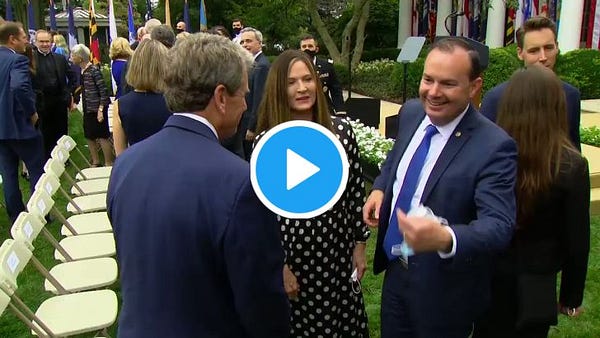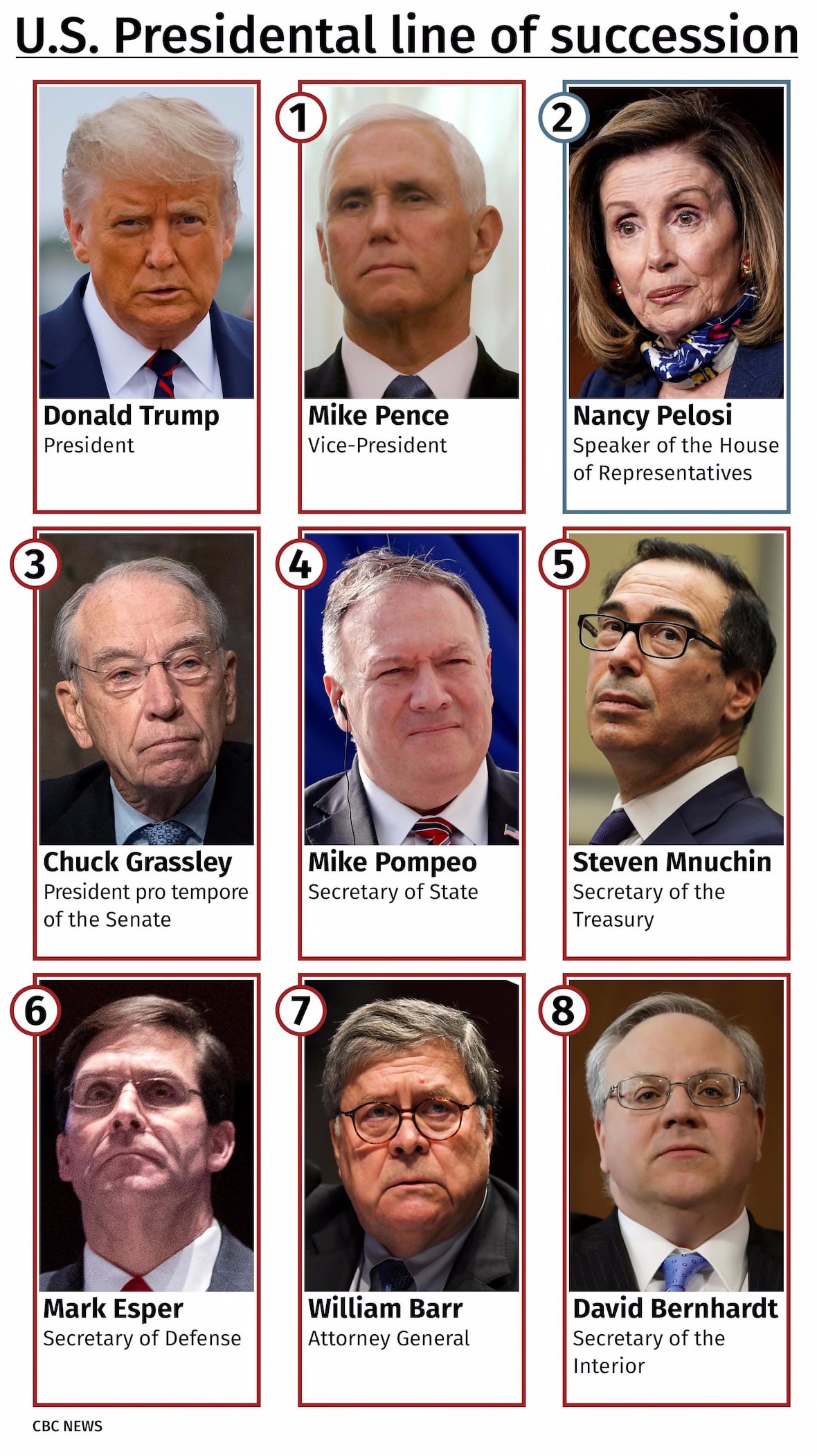INSIGHT: Trump's Coronavirus Convulses US Election; Pandemic Roils Global Politics and Livelihoods; New War Emerging in former USSR; France’s Macron "Betrayed" Blames Hezbollah
Trump’s Covid-19 Hospitalization Changes the Scene for Nov. 3. Pandemic is Changing Political Landscape in US and across the planet.
CAN 2020 HOLD ANY MORE SUPRISES?

In a year that looks like one of the final seasons of the drama House of Cards, when writers kept coming up with increasingly less believable plot lines, this week brought the most reality-defying turns. A famous leader once said there are decades when nothing happens, and there are weeks when decades happen. This was one of the latter.
Just a week ago, President Donald Trump gathered with allies at the White House lawn to nominate his candidate for the Supreme Court, dismissing Justice Ruth Bader Ginsburg’s deathbed request that the winner of the election name her successor. Six days later, more than a dozen people who attended the event, including the president and his wife, have been diagnosed with Covid-19. The news overtook other bombshells still smoldering from a few days earlier. Those included a New York Times report about his taxes, which brought news that Trump is personally responsible for hundreds of millions in debt; a calamitous presidential debate, where Trump refused to condemn a white supremacist, antisemitic group; revelations of Trump’s mockery of his evangelical and other religious supporters; startling audio tapes of the first lady, and on and on.
Nothing, however, had the impact of news that Trump contracted the illness whose seriousness he spent the past seven months trying to minimize.
HIGHLIGHTS IN THIS ISSUE
Will Covid-19 Diagnosis Give Trump an Electoral Sympathy Boost?
How the Pandemic Has Transformed Life and Politics Around the World
Why New Fighting in the former Soviet Union Could Turn Very Ugly
How France’s Macron was Mugged by Reality in Lebanon – and Slapped Back Against Hezbollah
Could Trump’s Illness Help His Reelection?

It was the most shocking — and most predictable — news of the pandemic era when President Trump, who has mocked Democratic Candidate Joe Biden for wearing a mask, was diagnosed with Covid-19.
A serious illness normally elicits sympathy. Coming just before an election, it’s an obvious question whether Trump – assuming he recovers, which remains the most likely scenario – will benefit politically.
I will not celebrate his illness, as I explained. That, however, does not preclude recognizing that Trump assiduously denied the seriousness of the disease, despite knowing just how deadly it is. His actions contributed to the pandemic’s crushing death toll and economic impact. Because I think Trump has proven such a harmful president in this and other areas, I hope he pulls through and is soundly defeated at the polls, establishing clearly that the American people reject the style and substance of his most egregious actions.
Still, Trump’s support may see a brief sympathy bump. But this is no normal illness in a normal president. Trump made denial of the pandemic’s gravity, along with relentless efforts to misleadingly portray normalcy, mocking mask wearing, and pressuring CDC experts to ease safety recommendations, a centerpiece of his reelection strategy.
His diagnosis and hospitalization have demolished that strategy. A poll taken after the illness was made public but before hospitalization, found most Americans think he didn’t take enough precautions. A majority blame him personally for his condition.
With a month to go until Election Day, most voters have made up their minds, but the illness is a blow to Trump’s credibility, to his theory of the pandemic, to his claim to competence in managing it, to his efforts to take it off the front pages. It confirms that coronavirus is the central human, economic and political issue of 2020 – exactly what Trump wanted to avoid.

It is now clear that Trump’s Sept. 26 ceremony introducing Judge Amy Coney Barrett became a superspreader event. Multiple people who attended have been confirmed infected, among them KellyAnne Conway, a former top adviser. Conway’s daughter revealed the test results on social media, with a scathing (language warning) attack on the president.
Chilling videos of the event show several people now confirmed infected, Gov. Chris Christie, Sen. Mike Lee, Kelly Anne Conway, and others.


The only way the illness helps Trump, if at all, is that it obscures the other stains of a wretched week.
New surveys show Americans enduring severe economic hardship, loss of jobs, evictions, and the end of their savings. The economy, according to Friday’s jobs report, is slowing down.
Trump’s efforts to turn around his fortunes have flopped. His performance at the debate -- where he claimed the pandemic is all but over - was appalling, as I wrote in my instant analysis for CNN. Later, surveys showed he lost badly. Here’s one from FiveThirtyEight/Ipsos .

Most disturbingly, when asked to condemn white supremacists, Trump instead offered what sounded like a call to prepare for action:
“Proud Boys: stand back and stand by.”
Some Proud Boys members added the “Stand By” quote to the group’s logo.
The founder of the neo-Nazi website Daily Stormer, named after a German Nazi propaganda newspaper, wrote:
"I still have shivers. He is telling the people to stand by. As in: Get ready for war."
An Iranian exile explained that the Proud Boys are like Iran’s Basij militias, the regime’s brutal enforcers. I was reminded of watching Fidel Castro’s civilian brigades, and of Venezuela’s colectivos. I wrote about it for CNN here.
The pressure grew. A normally sycophantic Fox News anchor asked, “Are you against evil?” Trump eventually issued a condemnation of white supremacists on Fox News. But the damage was done.
Trump’s electoral strategy, in addition to pandemic denial, includes dividing the country and discrediting the election, potentially preparing to tell his followers to reject the results.
Trump’s illness has thrown yet another twist of uncertainty into what lies ahead for America.
The odds generally favor his recovery from the illness, but hardly guarantee it. Former Homeland Security Secretary Jeh Johnson suggested that those in the line of succession to the presidency should quarantine themselves.

Between now and Nov. 3, and even after, anything is possible.
Pandemic Upends Politics Across the Globe
It’s not only the United States where the pandemic stands at the center of people’s lives, creating a new social, economic, and political reality.
Perhaps it was fitting that Trump’s illness coincided with the dismal marker of more than one million Covid-19 deaths around with world.
A second coronavirus wave is causing tensions in countries that thought they had the problem under control, such as Israel, Spain, the Netherlands and others.
But it is in less developed countries where the tragedy is more acute.
Efforts to alleviate poverty have moved into reverse. The UN predicts 45 million people in Latin America will fall below the poverty line. In Asia, a study predicts 160 million will. Individuals who had built small businesses, who had acquired their own homes, who had hopes for a better lives for their children, are sinking back into grinding poverty.
A report by Freedom House says the pandemic is harming democracy, giving autocrats more tools for repression, eroding democratic freedoms in scores of countries. In addition to brutal new measures against government critics and stepped up human rights abuses, the pandemic has allowed corruption to flourish.
The good news is that the pandemic won’t last forever. My view is that a turning point in efforts to support democracies, defend human rights, and fight corruption around the world could strengthen after January, if the United States changes course and rejoins the cause.
A War Brewing in a Troubled Corner

Under normal conditions, diplomacy might have intervened earlier to prevent a conflict from exploding out of control. It did in the past when the former Soviet Republics of Armenia and Azerbaijan clashed over the disputed enclave of Nagorno-Kharabakh. This time, diplomats were slow, and some of the outside players, notably Turkey, seemed intent in stoking the flames.
Major wars have broken up over smaller disagreements. And this one has the potential to draw in heavyweights.
Armenia and Azerbaijan have been battling over the territory of 150,000 people for a long time. The enclave lies inside Azerbaijan’s borders, but the population is ethnic Armenian. Both countries claim it.
When the Soviet Union broke up, I was in Moscow and I well remember the dispute’s eruption. It raised fears that similar conflicts could explode across the collapsing USSR. Some 20,000 people died in fighting. A ceasefire came in 1994, and skirmishes have broken up repeatedly since then. But this one is different.
The two countries are bordered by interested regional powerhouses, included Russia, Turkey and Iran. And Europe, too, has a keen interest. Oil flows to the west through pipelines in the region, through Turkey.
Turkish President Recep Tayyip Erdogan, president of neighboring Turkey, backs Azerbaijan, whose people are mostly Turkic. Russia has a mutual defense pact with Armenia. Putin does not want or need a war right now. Erdogan, on the other hand, has been flexing his muscle. Foreign fighters from Syria have been brought into the fight on Azerbaijan’s side. Turkey denies it is recruiting them.
Moscow and Ankara are already facing off, mostly through proxies, in Libya and Syria.
Hundreds have been killed. Russia and Turkey have officially called for a ceasefire. So far, it hasn’t worked.
France’s Macron Smacked by Reality in Lebanon

When Beirut was devastated by an explosion in early August, French President Emanuel Macron was the first world leader to show up. He vowed to help the long-suffering Lebanese. His plan was to persuade Lebanon’s entrenched powers to work together for the good of the country. After all, Lebanon was on the verge of bankruptcy, services collapsing, poverty climbing, as political groups worked for their own sake rather than the country’s.
Two months later, Macron is feeling betrayed.
I wrote about it in my column at World Politics Review:
Macron lashed out with barely contained anger at Lebanon’s ruling class. But he reserved his most scathing attack for Hezbollah, the Iran-allied militant group and political party. “Hezbollah can’t be at the same time an army at war with Israel, an unrestrained militia against civilians in Syria, and a respectable party in Lebanon,” Macron told reporters in Paris. In his most withering remark, Macron said the quiet part out loud: “Is [Hezbollah] really a political party, or does it proceed just in a logic dictated by Iran and its terrorist forces?”
Macron vows not to give up, but so far, the skeptics have been proven right.
That’s it for this week.
Let me know what you think, at FridaInsight@gmail.com
Thanks to all of you who have offered comments, praise, criticism.
If you like INSIGHT, share it with your friends.
See you next week.
Stay healthy; stay informed; stay engaged.
Frida


